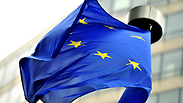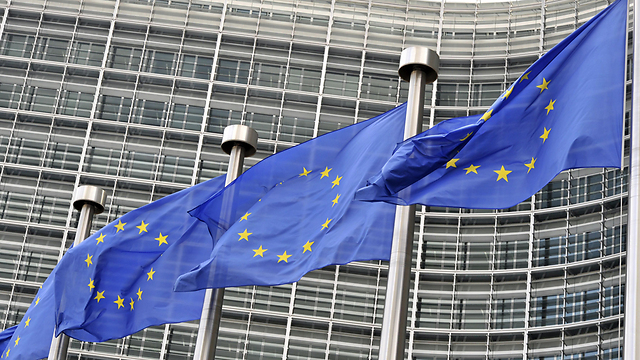
The European Union on Tuesday decided to postpone to next month a vote on a resolution recognizing a Palestinian state over disagreements on the wording of the motion.
Instead of the vote scheduled for Thursday, the European parliament will only debate the motion this week and vote on it December 18.
Left-wing parties who proposed the motion - the European United Left/Nordic Green Left (GUE) and the Progressive Alliance of Socialists and Democrats - believe such recognition could help lead to a peace accord with Israel.
On the other hand, the European People's Party, a center-right party which requested the postponement, wants to condition recognition of Palestine on first reaching a two-state solution through peace talks with Israel.
"The right-wing parties, who represent a majority in the European parliament, wanted a wording similar to the Spanish decision, which reads that recognition will be declared after Palestinians and Israelis reach a peace agreement," PA official Nabil Shaath told Palestinian news agency Ma'an.
The move comes on the heels of Sweden's decision to recognize Palestine and symbolic votes on the topic in Spain, Britain and Ireland. It reflect mounting frustration in the EU at Israel's expanding settlement program on land the Palestinians want for a state following the collapse of US-sponsored peace talks.
Reports received by the Israeli Foreign Minister indicate similar votes on recognition of a Palestinian state are expected in other European parliaments in coming weeks, among them Portugal, Italy and Slovenia.
A senior Foreign Ministry official said that "this is an avalanche" and that Israel does not have a lot of tools to deal with such a wave because of the freeze in diplomatic talks.
Israeli officials, including government ministers, accuse US President Barack Obama's administration of fanning the flames.
'A big mistake for peace'
Prime Minister Benjamin Netanyahu warned on Tuesday that a European recognition of a Palestinian state was "a big mistake for peace."
"These twin needs of mutual recognition and solid security arrangements on the ground, which are so essential for peace, these are not addressed by the European countries that unilaterally give recognition to a Palestinian state," he told visiting Czech Prime Minister Bohuslav Sobotka.
"I think these European positions actually push peace away, and I believe that they make reaching a solution much harder," he continued.
"It encourages the Palestinians to harden their positions, not to compromise on mutual recognition, not to compromise on the things that are needed to achieve genuine security."
Israel has been working to foil the decision, with officials warning that if the motion passes, the country will view Europe’s decision as anti-Israeli. Israel's ambassador to the European Union David Walzer and members of his delegation held urgent meetings recently with the parties' political advisers. The ambassador also held an urgent briefing meeting with dozens of members of the European Parliament.
After Sweden officially recognized the state of Palestine in October, the Social Democrats announced its widespread support of the move, and the president of the center-left party stated that such a decision would be the only solution to end the Israeli-Palestinian conflict, and that it would benefit both parties.
He claimed that the EU should be more involved in the peace process and recognize Israel and Palestine as two nation states living side-by-side. He also said that the French faction in the European Parliament would push for recognition of a Palestinian state, as well as some other left-wing factions.
Ambassador Walzer, however, stressed that a unilateral recognition of a Palestinian state will not help in bringing Prime Minister Benjamin Netanyahu and Palestinian President Mahmoud Abbas to the negotiation table but will only push the two sides further away.
The GUE group's draft text “urges all EU member states … to recognize the state of Palestine on the basis of the 1967 borders with Jerusalem as the capital”.
The European Parliament's decision to recognize the state of Palestine could increase pressure on European member states to follow Stockholm's lead.
Along with Sweden, three other European legislatures called for their governments to recognize Palestine: Britain, Ireland and Spain. However, their decision to issue only symbolic and not binding. Several other parliaments are going to discuss and vote on the issue, and next in line are France and Denmark.
Ynetnews contributed to this report.
















